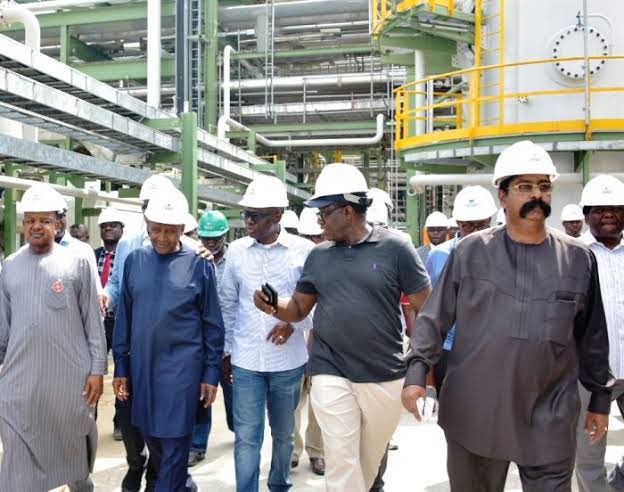Dangote Petroleum Refinery has signaled its readiness to export petrol (Premium Motor Spirit – PMS) if domestic buyers, including the Nigerian National Petroleum Corporation (NNPC) and other oil distributors, fail to patronize the refinery.
In an announcement made by Devakumar Edwin, Vice President of Oil and Gas, Dangote Industries Limited, during a live broadcast of the Brekete Family show on Monday.
Edwin disclosed that the refinery, which had already been exporting aviation fuel, kerosene, and diesel, commenced PMS production on Sunday, marking a significant milestone for Nigeria’s oil and gas sector. This development positions the Dangote Refinery as a major player in the domestic market, but also reveals the challenges it faces in selling its products within the country.
“We have been exporting aviation fuel, we have been producing kerosene, we have been producing diesel, but yesterday, we started the production of PMS. So, that was the last stage. The only thing now left out is petrochemicals,” Edwin stated.
He emphasized that the refinery is prepared to meet the country’s PMS needs, but highlighted an ongoing blockade by traders that has hindered the lifting of Dangote’s products within Nigeria.
“Well, I explained how there has been a kind of a blockade from lifting our products within the country. The traders have been trying to block (it), and so now we have been exporting our petroleum products,” Edwin continued.
“PMS, we are ready to pump in as much as possible to the country. But if the traders or NNPC are not buying the product, obviously, we will end up exporting the PMS as we are doing with the aviation jet and diesel.”
The implications of this statement are profound. Nigeria, which has long struggled with the importation of refined petroleum products despite being one of the world’s largest oil producers, could see a shift in its energy dynamics if the Dangote Refinery opts to export its PMS.
This could lead to increased competition among local distributors or force the NNPC and other key players to reconsider their purchasing strategies to ensure the country’s fuel needs are met.
The Dangote Petroleum Refinery, with its state-of-the-art facilities, is poised to become the largest single-train refinery in the world, and its potential to reshape Nigeria’s oil and gas industry cannot be overstated.
However, the ongoing tension between the refinery and domestic traders raises questions about the future of Nigeria’s petroleum market and the extent to which the country can rely on its own refining capabilities.
Industry analysts suggest that if the refinery follows through on its threat to export PMS, it could lead to shortages in the domestic market, driving up prices and exacerbating the already challenging economic conditions faced by Nigerians. On the other hand, exporting the product could generate significant foreign exchange earnings for Dangote Industries, boosting Nigeria’s overall economic profile.
The NNPC, which has traditionally been the primary importer of PMS, now faces a critical decision: whether to engage with the Dangote Refinery and secure a stable domestic supply or risk the consequences of increased exports.
The coming weeks will likely see intense negotiations and strategic maneuvering as stakeholders in Nigeria’s oil and gas sector seek to navigate this complex situation.
As the Dangote Petroleum Refinery continues to expand its production capabilities, all eyes will be on how this unfolding scenario plays out and what it means for Nigeria’s energy future. Will the country embrace this new domestic refining powerhouse, or will it see its products shipped off to foreign markets? The decision could shape the nation’s economy for years to come.




